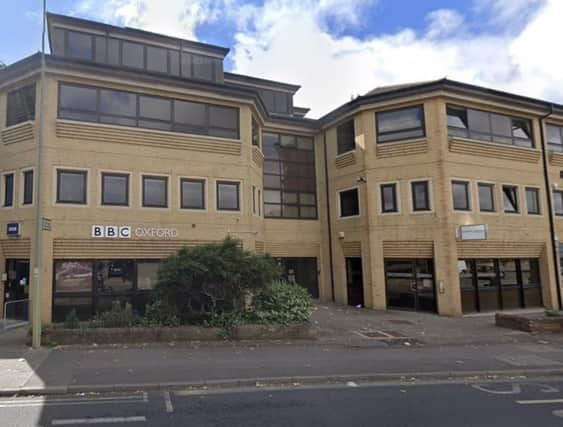Banbury Guardian joins Oxfordshire journalists slamming plan to slash BBC's local output


The Banbury Guardian news team has sided with the Oxfordshire branch of the National Union of Journalists (NUJ) in calling on the BBC to abandon its plan to axe South Today TV news and slash BBC Radio Oxford bulletins.
The BBC announcement has been met by astonishment and outrage. Journalists say politicians and others in the news will not be held to account in the same direct way.
Advertisement
Hide AdAdvertisement
Hide AdBanbury Guardian senior reporter Roseanne Edwards said: There is no substitute for a live interview where those in the news have to answer questions directly to the public in real time.
"We, in newspapers, report matters in words on paper. That is not the same. And for the BBC to be reducing the BBC Oxfordshire output in order to put text news up online is an unnecessary and damaging duplication.
"Radio Oxford and South Today TV are highly respected in the community. The journalists know their patch and are incredibly important in maintaining a decent level of democracy in our county.
"People listen to their radio bulletins in the workplace and car and many have South Today TV news on while having their meal after work. Many don’t want to get their news online; they like their daily news routine away from their laptops and phones.”
Advertisement
Hide AdAdvertisement
Hide AdLeader of Oxfordshire County Council, Cllr Liz Leffman called the move ‘disappointing’ and described BBC Oxford’s coverage as a ‘key component’ of local democracy.
Under the proposals, viewers in the county would have a severely reduced television news service, with local stories competing against pieces from a vast southern region. The familiar broadcasting team in Oxford will be disbanded and news will come from Southampton.
Cuts to BBC local radio are equally drastic. The proposals involve scrapping programmes targeted at local audiences to be replaced by shows shared between several regional stations after 2pm on weekdays.
In the evenings and weekends, shared programmes will span even larger regions – and on late nights and Sundays after 2pm there will be just one programme covering the whole of England.
Advertisement
Hide AdAdvertisement
Hide AdAnna Wagstaff, Secretary of the Oxford and District branch of the NUJ said: “Local radio and television are an important part of local communities, our shared identity and how we talk to one another. Trying to provide that service across larger regions with no such shared interests or identity makes no sense and has always failed in the past.
“We know BBC Oxford is immensely valued as a truly local broadcaster. In 2011, the BBC’s proposals to axe Oxford TV news and merge vast parts of local radio with Five Live were reversed, thanks to an enormous public backlash.
“We are asking people to add their voices to calls for the proposals to be dropped, by writing to their MPs and to BBC heads: the BBC Director General Tim Davie ([email protected]), the Director of BBC Nations Rhodri Davies ([email protected]), and the Acting Director of BBC England Jason Horton ([email protected]).”
In August, Oxford City Council came out strongly against the proposals to end the local TV news service saying: “The value of regional television news services is about more than audience size – it is about an informed public able to hold decision-makers to account.
Advertisement
Hide AdAdvertisement
Hide Ad"Local democracy will be worsened. This is also a cut that disproportionately affects older people and those without access to digital services.”
The BBC Oxford NUJ Chapel said: “BBC management claims that these changes will future proof BBC Local, because traditional linear audiences are declining.
"The ambition is for all services – but mainly digital – to reach at least 50 per cent of the audience each week. But what they’re throwing away is vast swathes of local output on the radio, highly valued by audiences from all walks of life, but especially the most vulnerable and marginalised in society.”
It is understood South Today TV would close a week before Christmas. Staff do not know if they will have jobs but they believe only one reporter will be retained out of 18 editorial and technical staff.
Advertisement
Hide AdAdvertisement
Hide AdRhodri Talfan Davies, BBC Head of Nations, said on BBC’s The Media Show: “Audience behaviour changes and so does the BBC, so it's absolutely right that as we see growing use of online news services, the local news services provided by the BBC keep pace with that change.
"This is a shift we're seeing right across the age groups and it is about the BBC keeping pace with that, because ultimately we are accountable to licence fee payers and they want value from us.”
Mr Davies agreed this would mean predominantly text articles. He said it did not think the argument about duplication with existing newspapers publishing online held true.
Henry Faure Walker, CEO of Newsquest, which owns the Oxford Mail, said on the same programme: “Obviously we’re very concerned about the BBC expansion into local news. We think it's potentially very damaging and will in our view, further undermine the efforts of ourselves and other commercial local news publishers to build a sustainable future because it diverts eyeballs away from our sites.
Advertisement
Hide AdAdvertisement
Hide Ad"I just don't see the need for the BBC to come into this space. I don't think the BBC should be using a licence fee to do things that already well provided by the commercial sector and even worse, come in and distort the sector and make it even tougher for local news publishers who have had it pretty hard in the last 10-15 years. We think it was a case for Ofcom to intervene and I have to say we're disappointed by the passivity of that regulator.
"We we need to be profitable to sustain journalism. Without profits there is no sustainable model for local journalism.”